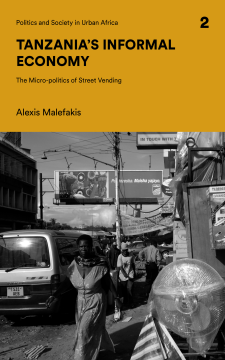
Additional Information
Book Details
Abstract
The market places and street corners of Dar es Salaam are home to a thriving informal economy of street vendors selling secondhand clothing and other goods. These street vendors often live a precarious existence, under pressure from state authorities and international markets. In addition to these external pressures, the experiences of such vendors are also shaped by a complex interplay of internal tensions, rivalries and conflicting communal ties. Such internal dynamics are a common part of informal economies around the world, but have largely gone unrecognised and unexamined by academic scholarship.
Based on ethnographic fieldwork and extensive interviews with vendors living and working in Dar es Salaam, Malefakis’s book offers a nuanced portrait of those trying to carve out a livelihood in a major African city, one in which ties of kinship and ethnicity are often viewed as a barrier, rather than an aid, to success. In the process, Malefakis provides an invaluable new perspective on the way in which co-operation, or lack thereof, functions in an informal economy, as well as insight into the lived experiences of those who depend on such economies.
Alexis Malefakis is Africa curator of the Ethnographic Museum at the University of Zurich, where he also works as an academic researcher. He previously lectured at the University of Konstanz, Germany. His previous works include Making a Living from Old Shoes: Tanzanian Street Vendors as Urban Experts (2016) and Auto Didaktika: Wire Models from Burundi (2017), both of which are based on exhibitions he curated at the museum.
Table of Contents
| Section Title | Page | Action | Price |
|---|---|---|---|
| Cover\r | Cover | ||
| About the author | ii | ||
| Title Page | iii | ||
| Copyright | iv | ||
| Contents | v | ||
| Acknowledgements | vii | ||
| Introduction | 1 | ||
| Looking beyond the informal economy | 7 | ||
| Social theoretical foundations of the study | 9 | ||
| Sociality | 9 | ||
| Narrative | 10 | ||
| Spatial practice | 12 | ||
| Temporality | 14 | ||
| Chapter overview | 15 | ||
| 1. Street vending in Dar es Salaam | 19 | ||
| A brief history of struggle | 20 | ||
| After independence: resuming colonial policies | 24 | ||
| Street vendors in Dar es Salaam today: a desire for change | 30 | ||
| Ethnographic fieldwork with mobile street vendors | 31 | ||
| 2. Urban perspectives on rural pasts: a narrative of ‘being Wayao’ in Dar es Salaam | 37 | ||
| From the village to the kijiweni | 39 | ||
| Narrating Wayao-ness | 42 | ||
| Being Wayao in the city | 46 | ||
| 3. The micro-politics of sociality among Wayao street vendors | 51 | ||
| Sources of uchawi | 56 | ||
| Pinned down by ‘dirty magic’: the story of Rahim | 57 | ||
| On the flip-side of uchawi: replicating kinship-like relations | 61 | ||
| 4. Too familiar to trust: a paradox of social proximity | 67 | ||
| The case of the bank account | 68 | ||
| Theories of trust | 71 | ||
| Trust among self-organised workers | 72 | ||
| Opacity and trust | 75 | ||
| 5. The creative potential of shoe vending: practices and emerging sociality | 79 | ||
| 6. Carrying knowledge through the streets: old shoes as meaningful objects | 85 | ||
| The temporal organisation of Karume Market | 89 | ||
| Mapping shoes onto the streets | 93 | ||
| Grandmothers and city girls | 97 | ||
| Knowing how to act | 99 | ||
| 7. Sharing is daring: cooperation at the kijiweni | 103 | ||
| Sharing tools | 107 | ||
| Sharing profits | 110 | ||
| Practices of entrustment in the absence of trust | 116 | ||
| 8. Creating a market where there is none: the spatial practices of street vending | 123 | ||
| Finding your way through the streets | 126 | ||
| The rhythms of street vending | 130 | ||
| Talking to ‘witches’ and ‘whites’: categorising customers | 135 | ||
| Use the force: street vending with an attitude | 141 | ||
| The market as an epistemic landscape | 144 | ||
| Conclusion: Stuck in an extended present | 147 | ||
| Notes | 157 | ||
| References | 161 | ||
| Index | 173 |
